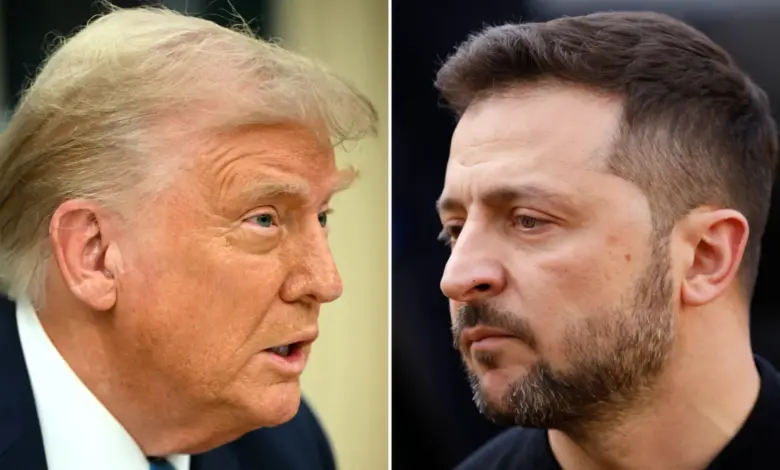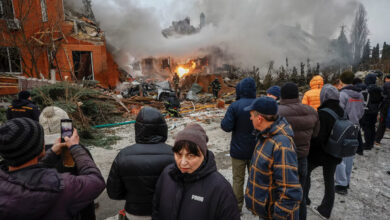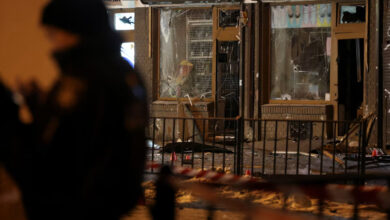
Donald Trump isn’t the only president who knows a bad deal when he sees one.
Volodymyr Zelensky’s refusal to sign away nearly half of his country’s rare earth minerals for very few future guarantees is one of many reasons why Trump has been driven into a rage at his counterpart in Kyiv.
The Ukrainian president has made clear that exploiting his country’s precious geographical and energy resources will be one way to rebuild its economy and cities after the eventual end of the war. But the offer tendered by Treasury Secretary Scott Bessent, while being lauded by US officials as a generous ladder to prosperity for Ukraine, is not really a “deal” at all.
However, it provides insights into Trump’s view of foreign policy and his perception of the war after he reversed, rhetorically at least, the Biden administration’s support for the invaded party and threw his weight behind the invader.
As with his plan to relocate all Palestinians out of Gaza so the US can build a “riviera” of beach resorts, the president’s motives appear to be rooted more in extracting the best potential monetary return for the United States than in equitably solving a murderous conflict that endangers the world. Trump is reflecting skepticism among his base voters toward the tens of billions of dollars of military and financial aid that the Biden administration sent to Ukraine after it was illegally invaded by Russian President Vladimir Putin’s forces three years ago. But Trump’s transactional approach represents a shattering of foreign policy values pursued by the United States for decades, including the principle that mighty nations should not invade smaller ones, which Washington enshrined in the United Nations charter.
His pressure on Ukraine, the victim in the conflict, is also a hardline effort to take advantage of a nation in its darkest hour. While Putin has carved off large chunks of its territory, Trump seeks a large slice of its mineral wealth at a knockdown price. The “deal” looks rather like a form of extortion that Trump tried on Zelensky once before — floating military aid as an incentive for him to announce an investigation into Joe Biden, which led to Trump’s first impeachment.
Still, the White House says Zelensky has no choice but to sign the pact to pay back US taxpayers for Kyiv’s lifeline — even though it contains no assurances that Washington will keep the aid coming in the future.
“President Trump is obviously very frustrated right now with President Zelensky,” White House national security adviser Mike Waltz said on Thursday. “The fact that he hasn’t come to the table, that he hasn’t been willing to take this opportunity that we have offered – I think he eventually will get to that point, and I hope so very quickly.”
A staggering US reversal
The clash over the rare earth minerals agreement comes amid a serious deterioration of US relations with Zelensky, driven by Trump’s adoption of Russian propaganda on the war, including the false charges that the Ukrainian leader started the conflict and that he is a dictator. The autocrat in this situation is Putin, who has run Russia for 25 years, imprisoned his opponents, crushed the free press and held sham elections. And he started the war.
The staggering US reversal on the war deepened Thursday as the Trump administration haggled with G7 members over a joint statement marking the invasion’s third anniversary, with US diplomats resisting a mention of “Russian aggression” in the document. Officials told CNN that other G7 members fear handing Russia yet another win, following the US siding with Putin over some of his demands on an eventual peace before this week’s talks in Saudi Arabia.
While Trump says he is convinced that Putin wants to stop the war and is serious about talking peace, US and allied intelligence agencies are less bullish. Three sources familiar with Western intelligence told CNN’s Katie Bo Lillis and Natasha Bertrand that Putin remains fixated on either subsuming Ukraine into Russia or ensuring a small, weak state that is dependent on Moscow. “If you were to get a ceasefire, then a ceasefire is just time for Putin to take a rest and rearm and come back and get the rest of what he wants,” said one of the sources. “We’ve seen no indications whatsoever that his ambitions have changed.”
The events of the last few days, which have left Ukrainians feeling betrayed, US allies alarmed, and even some Republican senators outraged, have renewed debate about Trump’s motives and how they will influence the chances of a fair peace deal.
Is the president being driven by personal animosity toward Zelensky? Or contempt for a smaller nation in need, as he seeks to reorient US foreign policy to promote a spheres of influence system controlled at superpower summits by strongmen like himself, Putin and Chinese President Xi Jinping?
Or is Trump, as he often has before, choosing a hardline position simply to create negotiating room for himself? Could his adoption of many of Putin’s talking points and leaning hard on Zelensky be designed to lure the Russian president to the table for a tough bargaining session? Certainly, Trump’s good relationship with Putin could position him, more than any other Western leader, to influence Russia’s conduct and potentially extract concessions.
A peace that endures; permits Ukraine to continue existing as independent, sovereign state; avoids rewarding Putin’s expansionism; and saves millions of lives would be a huge legacy achievement for Trump. The current war of words between Washington and Kyiv does not preclude an eventual and serious negotiation — and will soon be forgotten if a peace can be brokered. Still, Trump is yet to show evidence that he’s drafting a clever plan to call the Kremlin’s bluff. Trump’s wild words often cause his critics to overreact, but words are important in this case — since the president is obscuring the basic facts about what caused the war, which is a fundamental flaw in a leader who is positioning himself to lead peace negotiations.
Trump’s parroting of many of Putin’s positions has also renewed debate about his fascination with the Russian leader, which, in his first term, saw him publicly repudiate his own intelligence agencies’ assessments that Russia meddled in the 2016 election.
Trump’s latest favoritism toward Putin drew a raw public and emotional rebuke from a key Republican senator facing reelection in 2026. North Carolina’s Thom Tillis said he agreed with most of the president’s instincts on national security but added: “Whoever believes that there is any space for Vladimir Putin and the future of a stable globe, better go to Ukraine, they better go to Europe.” Tillis went on about Putin: “They better invest the time to understand that this man is a cancer and the greatest threat to democracy in my lifetime. And it will be a cancer that spreads into the South China Sea, into Taiwan and metastasized across the globe.”
Why Zelensky couldn’t accept the ‘deal’
The proposed minerals deal raises questions not just about its terms but also the White House’s understanding of the political dynamics in Ukraine.
There’s no way that Zelensky or any other Ukrainian president could have accepted the “deal” to hand over much of his country’s geological inheritance and a key to its future economic viability. If he had, his approval rating probably would tumble near to the 4% level that Trump falsely claims it’s already at as he demands that Zelensky hold an election, which has been delayed because of martial law amid Russian attacks. Appreciating Zelensky’s political situation is crucial, because any peace is going to be a painful pill that the Ukrainian leader will have to convince his country to swallow since it is almost certain to enshrine Russia’s hold on stolen territory.
Zelensky said at the Munich Security Conference last weekend that he’d not allowed one of his ministers to sign the first draft of the minerals deal with the United States. “The agreement is not ready to protect us or our interests,” he told reporters, noting that he did not see how the draft provided security guarantees for Ukraine.
But it’s still possible that the first US attempt at a deal could provide the framework for a future agreement. Zelensky hasn’t, for example, ruled out an agreement. But he is seeking to use the leverage of his country’s resources to obtain the security guarantees that Ukraine needs to survive after any peace deal.
The original rare earth mineral deal focused on compensating the United States for past aid to Kyiv, and specified the natural resources that would form part of the deal on over a dozen pages, two sources familiar with the document told CNN. Zelensky said Wednesday the contract asked for the US to own, or receive revenue from, 50% of Ukraine rare earth mineral mining and other natural resource sectors. The sources said the document said it asked for compensation not for future US assistance to Ukraine, but for previous aid.
Speaking on Fox News on Thursday morning, Waltz said it was time to for Ukraine to stop “bad-mouthing” Trump because of all the good he and the United States had done for the country. “It’s unacceptable. They need to tone it down and take a hard look and sign that deal,” he said.
While Ukraine’s language has been spicy in recent days — Zelensky accused the US president of dwelling in a “disinformation space” — most of the heightened rhetoric followed Trump’s own false claims and accusations.
In the United States and Europe, the furor provoked by Trump’s turn against Ukraine is a political issue. But for Ukrainians it’s a matter of life and death.
“Ukrainians feel like they are the only adults left in the room,” Sasha Dovzhyk, director of the Institute for Documentation and Exchange, told Paula Newton on CNN International. “What we have currently in the news is tantrums from someone we considered a world leader, and Ukrainians are basically left to face up to the deconstruction of the world order.”
She added: “We are not new to this fight; the only addition is that currently we are facing aggression and misinformation from another side — which is the side of our great ally the United States of America.”




